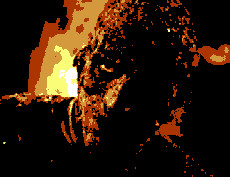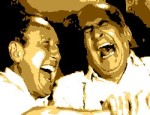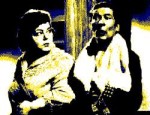Film Review

The Mummy suffers somewhat from the fact that its ghoulish protagonist is the least interesting of Hammer's movie monsters. It's essentially just a dumb walking corpse that goes around strangling people at the request of its master - not much scope for character development there. Robbed of the power of speech, with most of his face hidden by layers of latex, Christopher Lee is only called upon to look menacing (something he does superbly), and so you could hardly describe the Mummy as a well-rounded character. Peter Cushing is better served as the dusty archaeologist with an implausibly good taste in women (he happens to have married the one person who is the spitting image of the princess the Mummy once had a crush on), but even he struggles to make his character interesting.
Adding to the impression that The Mummy was thrown together in too much of a hurry by a company out to make a quick buck with the least effort, the film's production values are well below par for Hammer. Studio bound, many of the exterior scenes appear shoddy and unconvincing, particularly the jungle set which looks distinctly phoney. The funeral procession we see in an overlong and somewhat unnecessary flashback sequence shows up the budgetary constraints too clearly - the hilarious procession of hardboard and polystyrene doesn't so much suggest artefacts of Tut as items of tat. Even the film's most iconic scene, the Mummy emerging from a swamp, is marred by poor lighting and cheap set design.
Whilst The Mummy fails to match up to the excellence of Hammer's previous Gothic horror offerings it still manages to be an enjoyable romp, the sheer absurdity of its plot adding to its entertainment value. Cushing and Lee are as commanding as ever, aided by a supporting cast that appears to have an even less tenuous grip on reality. George Pastell very nearly steals the film as the Mummy's menacing minder and, as the token female, Yvonne Furneaux brings a touch of old-fashioned glamour to the proceedings. Terence Fisher directs the film as well as he can, but with unconvincing sets and a weak script he has his work cut out for him. The Mummy is a middling horror amusement and it should definitely have stayed in the bog where it ends up. Unfortunately, Hammer couldn't let sleeping eviscerated Egyptian corpses lie, and so three dismal sequels ensued: The Curse of the Mummy's Tomb (1964), The Mummy's Shroud (1966) and Blood from the Mummy's Tomb (1971). Some graves should just be left unopened.
© James Travers 2014
The above content is owned by frenchfilms.org and must not be copied.
Film Synopsis
In 1895, the eminent English archaeologist Stephen Banning and his son John are surveying the wonders of ancient Egypt when they come across the lost tomb of the Princess Ananka, high priestess of the Egyptian god Karnak. Ignoring warnings of dire retribution from a local man, Mehemet Bey, Banning senior enters the tomb and is delighted with the discovery of an ancient relic, the Scroll of Life. Alerted by a sudden scream, the other members of the expedition follow the archaeologist into the tomb and are horrified to find him in a deep catatonic state.It isn't until Stephen Banning is safely back in England, tended to in a nursing home, that he comes out of his trance-like state. He confides in his son that on reading the Scroll of Life in Ananka's tomb he brought back to life the mummified Kharis, the high priest of Karnak. The latter was entombed with the princess after her death for daring to love her. His punishment for attempting to resurrect the princess is perpetual life, and now he is forced to do the bidding of whoever possesses the Scroll of Life. It so happens that this ancient artefact is now in the possession of Mehemet Bey, who intends punishing the Bannings for defiling the sacred tomb of Ananka.
It isn't long before the single-minded Mehemet has traced the Bannings to their quiet corner of England. He uses the ancient scroll to revive the dormant Kharis - whose appearance is hardly improved after accidentally falling into a swamp - and then orders him to murder Stephen Banning. When another member of the expedition is slain in front of his own eyes, John Banning realises that his life is in great danger. Unfortunately, the local police find it hard to accept his fantastic story about a rampaging killer mummy. It is only a question of time before Kharis returns to Banning's house to claim his third victim. By an odd quirk of fate, the archaeologist's wife Isobel is the exact likeness of the Princess Ananka...
© James Travers
The above content is owned by frenchfilms.org and must not be copied.
Similar Films
Here are some other films you may enjoy watching:- Blood from the Mummy's Tomb (1971)
- White Zombie (1932)
- Dracula: Prince of Darkness (1966)
- The Plague of the Zombies (1966)
- -- And Now the Screaming Starts! (1973)
Other related links:
Film Credits
- Director: Terence Fisher
- Script: Jimmy Sangster
- Cinematographer: Jack Asher
- Music: Franz Reizenstein
- Cast: Peter Cushing (John Banning), Christopher Lee (Kharis, the Mummy), Yvonne Furneaux (Isobel), Eddie Byrne (Inspector Mulrooney), Felix Aylmer (Stephen Banning), Raymond Huntley (Joseph Whemple), George Pastell (Mehemet Bey), Michael Ripper (Poacher), George Woodbridge (Police Constable), Harold Goodwin (Pat), Denis Shaw (Mike), Gerald Lawson (Irish Customer), Willoughby Gray (Dr. Reilly), John Stuart (Coroner), David Browning (Police Sergeant), Frank Sieman (Bill), Stanley Meadows (Attendant), Frank Singuineau (Head Porter), James Clarke (Priest), John Harrison (Priest)
- Country: UK
- Language: English
- Support: Color
- Runtime: 88 min
The very best of French film comedy

The Carry On films, from the heyday of British film comedy

Kafka's tortuous trial of love
